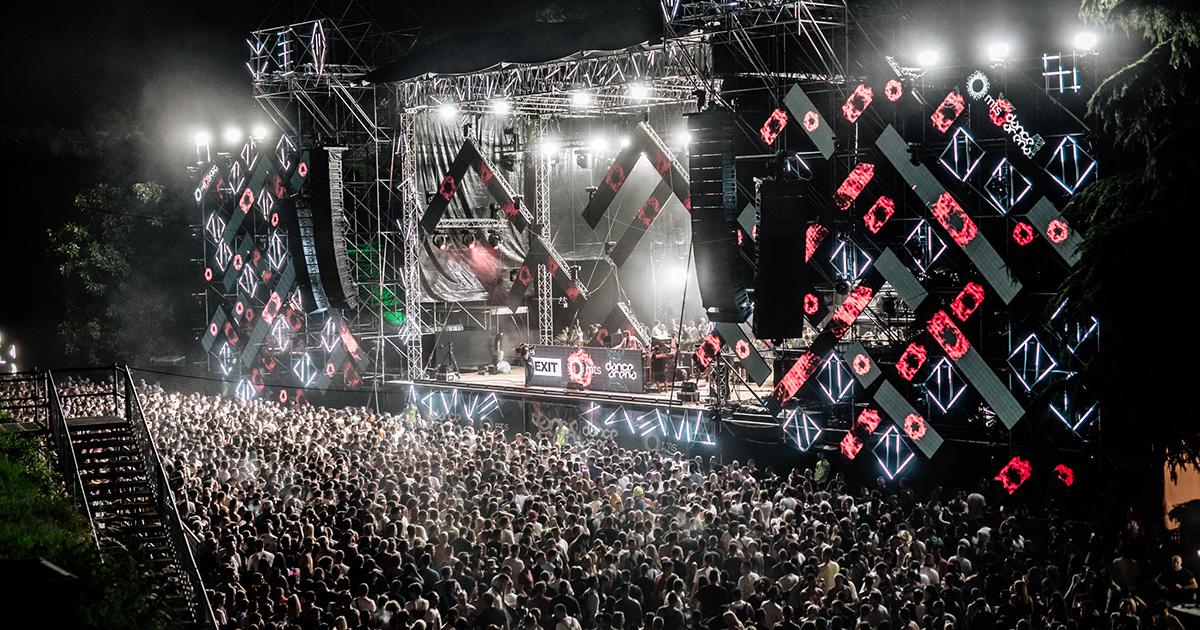How EXIT Grew to Be One of the Key European Music Festivals
In many moments throughout history, music has acted as a message of resistance. The 1960s hippie counterculture peaked with Woodstock, Punk Rock mobilized the working classes in the 1970s and 1980s, and the world celebrated the fall of the Berlin Wall while David Hasselhoff sang about freedom on a nearby crane. Since medieval times, music and festivals have remained a welcome escape from the mundane, and an important occasion for spreading messages of empowerment, change, and endless possibilities. Such were the beginnings of EXIT.
Eat, sleep, involve, repeat
In 2000, Serbian students threw a party in Novi Sad with a specific purpose: to encourage young people towards political participation and bringing down the unwelcome regime together (which was ultimately achieved). Over the next 20 years, EXIT has grown from this small, socially-charged event into a mainstream behemoth, regularly topping various “best travel experiences” lists, winning multiple international awards, such as Best Major Festival at the European Festivals Awards (2013 and 2017), and contributing around €18M to the local economy annually. As all families tend to grow over time, the EXIT brand now spans five international festivals, including No Sleep Festival in Serbia, Sea Star Festival in Croatia, Sea Dance Festival in Montenegro, and Revolution Festival in Romania, all attracting music industry heavy-hitters, from Skrillex to Madonna, and visitors from more than 70 countries.

Fun facts brought to you by our 2019 data and Exit's own 2010-2019 stats.
Return visits and new records
The 40 festival areas at EXIT have seen many, MANY people over the last 20 years. Just in 2019, a record 200k people visited EXIT Festival, pushing the number of total worldwide audience since 2000 to almost 3M. No wonder, as the lineup grows each year in both impressive names and sheer size. The number of international acts has grown tenfold in 15 years (there were around 40 acts in 2001, around 400 in 2015, and already around 500 at the 2019 edition), mostly focusing on contemporary “urban” acts. The majority of acts come from Serbia (around 65%), and the 2019 international ensemble also featured acts from Jamaica, Brazil, South Africa, and India.
As seen in the visual above, the Electronic genre is the most prevalent (a consistent trend at major European festivals), with Rock, Hip Hop and Latin (Reggaeton, Salsa etc.) usually following in percentages that reflect the respective genres’ and artists’ popularity each year. “Repeat offenders” can be expected in the lineups – like Techno royalty Boris Brejcha, who is already announced to perform at the 2020 event, making it his third EXIT appearance in a row. The Prodigy headlined four times, Paul Kalkbrenner and Amelie Lens have both performed twice already (with Amelie announced for Sea Star Festival 2020), and Solomun has been spinning tunes during the morning hours as far back as 2010.
Looking at artists' online popularity numbers, it’s no wonder they favour (return) festival appearances. During June, July, and August 2019, some of the EXIT performers significantly increased their Instagram and Spotify following. In the Electronic/Techno section, The Chainsmokers gained 1.2M Spotify followers and almost 0.5M Instagram followers, while rising star Peggy Gou impressed with 228k more followers on Instagram and 38k on Spotify. In the Hip Hop/Trap segment, it was a close match between Skepta and Desiigner, and Desiigner came out on top with 178k new Instagram and 118k new Spotify fans. And in the “Rock Legends vs. Newcomers” corner, the festival season was a smash hit for The Cure and Greta Van Fleet, who both killed it on Spotify, with 175k and 116k new followers, respectively.
Add a welcoming audience and long-standing professional relationships, and there’s your recipe for festival success.

Hat trick: after his 2019 performance, Boris Brejcha has already announced his return to the 25k-capacity stage for the third consecutive year.
Source: Marko Obradović Edge/EXIT2019
What’s the formula for growth?
Choosing the right matches among artists (not to mention other providers, such as food vendors and activities) can be challenging, as the public’s tastes change with time. Still, EXIT's organizers seem to have their collective finger reliably on the audience’s pulse. For example, the last European summer festival season saw a surge in Techno’s popularity, and EXIT was well in the game, as 20% of the 2019 lineup were Techno names.
“EXIT lineups are always a balanced combination of the most popular names and the acts that we love to work with.”
According to festival organizers, the secret lies in a balanced formula between intuition and industry know-how. Igor Vidović, EXIT’s Digital Marketing Manager, explains that the festival’s vision is to not only bring the hottest artists to the Petrovaradin fortress, but to symbolically help the Serbian youth make up for the time collectively lost during the 1990s.
To create a booking shortlist, the EXIT team therefore takes care to regularly reach out to people and ask which bands and artists they’d love to see perform. Keeping social responsibility in mind, the 2.0 iteration of the festival is also said to focus on rising environmental concerns. During the “Life Stream” format, fans can expect to see selected acts streamed directly, while the streams will also feature direct calls to world leaders and the general public, urging them to take crucial steps towards preserving life on the planet.
Whether it’s partying for a purpose, discovering new acts or just letting loose, EXIT’s 20th birthday bash plans provide on all sides. For details, make sure to check out our festival page.
Cover photo: Bernard Bodo/EXIT2019
Read this next:
Techno Invasion: The Most Booked Artists of the Festival Season
Pukkelpop’s Numbers, Alternative Edge, and the Artists That Got on Our Radar

Premium music analytics, unbeatable price: $19.90/month
11M+ artists, 100M+ songs, 19M+ playlists, 6K+ festivals and 100K+ labels on one platform, built for industry professionals.


